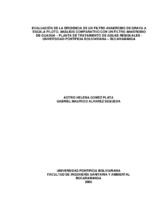Evaluación de la eficiencia de un filtro anaerobio de grava a escala piloto, análisis comparativo con un filtro anaerobio guadua - planta de tratamiento de aguas residuales Universidad Pontificia Bolivariana - Bucaramanga
Fecha
2013-06-21Director/Asesor
Rojas Ibañez, Cesar Enrique
Tipo de contenido
bacherlorThesis
Citación
Metadatos
Mostrar el registro completo del ítemDocumentos PDF
Resumen
Se evaluó el funcionamiento y operación de un filtro anaerobio de flujo ascendente a escala piloto, en la planta de agua residual de la Universidad Pontificia Bolivariana. La investigación se realizo en cinco fases. La primera fue la recopilación bibliográfica de los parámetros que garantizan la optimización del sistema. En la segunda fase, se diseño y adecuo cada una de las unidades que conforman el sistema, dando inicio a la tercera fase que es la puesta en marcha y montaje del filtro incorporando 1m de grava como medio de soporte e inoculando con lodo proveniente de la PTAR de Rió Frió, al cual se le realizo un estudio de actividad metanogénica. Durante el arranque del filtro (3 semanas) se evaluaron los parámetros de control los cuales son pH, temperatura, alcalinidad, ácidos grasos volátiles y relación AGVS/ALK. El sistema trabaja con tiempos de recirculación de 24, 36, y 48h, un caudal de 0.2785l/s, y un tiempo de retención de 10.85min. En la fase cuatro se evaluaron durante 4 meses los principales parámetros de eficiencia los cuales son DQO, DBO5, SST, sin descuidar los parámetros de control para evitar una desestabilización en el sistema. En la última fase se realizo un análisis comparativo entre la grava y la guadua medio utilizado en una investigación anterior bajo las mismas condiciones. La evaluación demostró que la grava como medio de soporte obtuvo remociones de DQO entre 60 y 82% cuando el tiempo de recirculación era de 48h, esto afirma que cuando el tiempo de recirculación aumenta los porcentajes de remoción son altos. Este comportamiento fue igual en la remoción de SST y DBO. La guadua arrojó porcentajes mayores de remoción de DBO, DQO y SST (81 – 95%), sin embargo la guadua demostró una inestabilidad pues los parámetros de control no cumplían los rangos óptimos. We evaluated the functioning and operation of a filter Flow Anaerobic Ascending on a pilot scale, at the Waste Water from the Universidad Pontificia Bolivariana. The research was conducted in five phases. The first was the literature collection of parameters that guarantee the optimization of the system. In the second phase, design and fits each of the units that make up the system, by launching the third phase which is the launching and assembling the filter incorporating 1m gravel as a means of support and inoculating with mud from the Rio Frio WWTP , which was conducted a study of methanogenic activity. During the startup of the filter (3 weeks) were assessed control parameters which are pH, temperature, alkalinity, fatty acids and volatile relationship AGVS / ALK. The system works with times of recirculation 24, 36, and 48h, a wealth of 0.2785l / s, and a retention time of 10.85min In phase four were assessed for 4 months the main parameters of efficiency which are COD, BOD5, TSS, while the parameters of control to avoid a destabilization in the system. In the last phase was carried out a comparative analysis between the gravel and bamboo medium used in a previous investigation under the same conditions. The evaluation showed that the gravel as a means to support removal of COD was between 60 and 82% if the recirculation time was 48h, it says that when the time increases the recirculation rate of removal is high. This behavior was the same in the removal of TSS and BOD. The bamboo showed higher percentages of removal of COD, BOD5 and TSS (81 - 95%), however the bamboo showed instability because the parameters of control did not meet the optimal rang
Palabra/s clave
Trabajos de grado ingeniería ambiental
Ingeniería ambiental
Tratamiento de aguas residuales
Planta de tratamiento de aguas residuales - Upb - Bucaramanga
Filtro anaerobio
Tratamiento biológico
Colecciones
- Trabajos de grado [6691]


